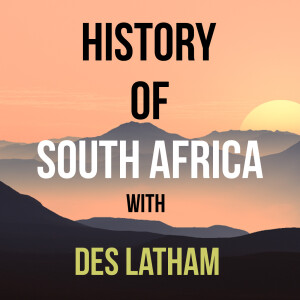
History of South Africa podcast
History

Episode 75 – Lord Charles Somerset reinforces the Fish River then meets the amaXhoseni and misreads Ngqika
 2022-07-17
2022-07-17
Download
Right click and do "save link as"
It had taken twenty years from the initial British landing on the Cape for the occupation to become permanent. So by August 1814, following the first abdication of Napoleon, the Netherlands regained independence with the Prince Orange re-installed as sovereign. The British duly restored some of his colonies to him – but not the Cape.
In 1803 Lord Nelson had said the Cape was not essential, but by 1814 this had changed. The problem for the Cape was that colonies were supposed to balance their own budgets – and the British had tried to help this little African back-water by allowing Cape wine growers to import their product into Britain for free. By 1813 sales had risen, and eventually and something that you’d probably be surprised to hear, by the time of the 1820 settlers, 10 percent of all wine drunk in the UK came from the Cape.
The big issue was most of this came from Crown lands, run on behalf of the government, not from independents. With such a vast territory, why were the cash receipts from the Cape so low? Sir John Cradock was busy reforming the loan farm system you heard about last episode which was supposed to lead to more productivity and sales as proper leases were signed.
Cradock was replaced by Lord Charles Somerset who took up the mantle of this farm improvement campaign. He was a descendent of the Plantagenet kings, and had lived a comfortable life at a place called Badmington. Somerset had also proved that soldiering in drawing rooms was safer and more profitable than actually doing any fighting.
Somerset travelled to the frontier to impose his policy of separation – and summoned Ngqika, Ndlambe, and lesser chiefs to meet him on the banks of the Kat River – the same place by the way that VOC governor Janssens had met Ngqika in 1802.
view more
In 1803 Lord Nelson had said the Cape was not essential, but by 1814 this had changed. The problem for the Cape was that colonies were supposed to balance their own budgets – and the British had tried to help this little African back-water by allowing Cape wine growers to import their product into Britain for free. By 1813 sales had risen, and eventually and something that you’d probably be surprised to hear, by the time of the 1820 settlers, 10 percent of all wine drunk in the UK came from the Cape.
The big issue was most of this came from Crown lands, run on behalf of the government, not from independents. With such a vast territory, why were the cash receipts from the Cape so low? Sir John Cradock was busy reforming the loan farm system you heard about last episode which was supposed to lead to more productivity and sales as proper leases were signed.
Cradock was replaced by Lord Charles Somerset who took up the mantle of this farm improvement campaign. He was a descendent of the Plantagenet kings, and had lived a comfortable life at a place called Badmington. Somerset had also proved that soldiering in drawing rooms was safer and more profitable than actually doing any fighting.
Somerset travelled to the frontier to impose his policy of separation – and summoned Ngqika, Ndlambe, and lesser chiefs to meet him on the banks of the Kat River – the same place by the way that VOC governor Janssens had met Ngqika in 1802.
More Episodes
012345678910111213141516171819
Create your
podcast in
minutes
- Full-featured podcast site
- Unlimited storage and bandwidth
- Comprehensive podcast stats
- Distribute to Apple Podcasts, Spotify, and more
- Make money with your podcast
It is Free
- Privacy Policy
- Cookie Policy
- Terms of Use
- Consent Preferences
- Copyright © 2015-2024 Podbean.com





